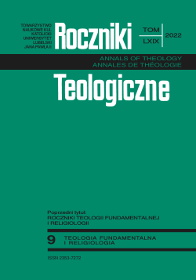The Church between Negation and Acceptance of the World
Abstract
The article addresses the problem of the Church’s relationship to the world. Christians have always been aware that they have been sent into the world to preach the Gospel, with the consequent aim of transforming the world so that the kingdom of God initiated by Christ could be realised in it. Thus, the mission of Christ’s disciples had to involve engaging with the surrounding reality in its social, political, cultural and economic dimensions. The aim of this article will be to show how Christians understood and implement their participation in shaping the human world. It is quite apparent that Christians have always faced (up until today) a dilemma that can be summarised in the phrase: the Church between negation and acceptance of the world. The unravelling of this dilemma was influenced mainly by two factors. The first was the awaiting of the end of time, which was to be brought about by the final coming of the kingdom of God. This motif in shaping the attitude of Christians towards the world played a decisive role in the first generations of Christ’s disciples, although it was also significant in later centuries. The second factor was the legal status of Christianity — above all in the Roman Empire, where Christianity took its roots most deeply and spread most widely. With these initial assumptions in mind, the article first examines the question of Christians’ hope for the imminent arrival of the kingdom of God, which had a significant impact on their activity in the temporal world. In the next stage of consideration, the period in which the radical change in the legal status of Christianity took place at the time of Constantine the Great and his successors is examined. These transformations fundamentally altered the Church’s relationship to the world while the legal and social position of the Church formed at that time affected for centuries the manner in which the Church was present in the world. The consequences of the transformations of the Constantinian era have persisted essentially into modern times. The examination of this issue has become the subject of the final section of this article.
References
Augustinus. Epistola CXCIX, PL 33, s. 904-925.
Augustinus. Epistola CXCVIII, PL 33, s. 901-904.
Backhaus, Knut. «Maranatha – Unser Herr, komm!» Das Neue Testament über den Sinn der Geschichte”. Theologie und Glaube (2000), 90: 93-115.
Balthasar, Hans Urs von. „Królestwo Boże a Kościół”. Communio. Międzynarodowy Przegląd Teologiczny (1986), 2: 35-42.
Brandenberg, Hugo. Die frühchristlichen Kirchen in Rom vom 4. bis zum 7. Jahrhundert. Der Beginn der abendländischen Baukunst, wyd. 3. Darmstadt: Verlag Schnell und Steiner, 2013.
Clemens Romanus. Epistula ad Corinthios I, PG 1, s. 199-328.
Codex Iustinianus, wyd. P. Krueger, wydanie internetowe: https://droitromain.univ-grenoble-alpes.fr/Corpus/codjust.htm (dostęp: 25.11.2021).
Codex Theodosianus, wydanie internetowe: https://droitromain.univ-grenoble-alpes.fr/Constitu tiones/CTh16.html#10 (dostęp: 26.11.2021).
Congar, Yves. O Kościół służebny i ubogi, tłum. Agnieszka Kuryś. Kraków: Cerf – Kairos – Znak, 2000.
Cyprianus, Liber ad Demetrianum, PL 4, s. 543-564.
„Do Diogneta”, tłum. Anna Świderkówna. W Pierwsi świadkowie. Pisma Ojców Apostolskich, wstęp, komentarz i opracowanie Marek Starowieyski, 339-350, wyd. 2. Kraków: Wydawnictwo M, 2010.
Dünzl, Franz. Fremd in dieser Welt? Das frühe Christentum zwischen Weltdistanz und Weltverantwortung. Freiburg im Br.: Verlag Herder, 2015.
Dzielska, Maria. „W kręgu problemów religijnych cesarstwa rzymskiego”. W Chrystianizacja Europy. Kościół na przełomie I i II tysiąclecia, red. Józef Dobosz, Jerzy Strzelczyk, 19-35. Poznań: Wydawnictwo Naukowe UAM, 2015.
Eigenmann, Urs. „Das Reich Gottes und seine Gerechtigkeit für die Erde”. Die andere Vision vom Leben. Luzern: Edition Exodus, 1998.
Eusebius Caesariensis. De vita Constantini imperatoris, PG 20, s. 909-1232.
Euzebiusz z Cezarei. Historia kościelna, tłum. Agnieszka Caba, Arkadiusz Lisiecki, opr. Henryk Pietras. Kraków: Wydawnictwo WAM, 2013.
Gnilka, Joachim. Pierwsi chrześcijanie. Źródła i początki Kościoła, tłum. Wiesław Szymona. Kraków: Wydawnictwo M, 2004.
Gnilka, Joachim. Teologia Nowego Testamentu, tłum. Wiesław Szymona. Kraków: Wydawnictwo M, 2002.
Gregorius Magnus. XL homiliarum in evangelia. Liber primus. Homilia prima, PL 76, s. 1078-1081.
Hipolit. „Komentarz do Daniela”. W Marian Michalski. Antologia literatury patrystycznej, t. 1, 195-207. Warszawa: Instytut Wydawniczy PAX, 1975.
Ilski, Kazimierz. „Prawne aspekty chrystianizacji Imperium Romanum”. W Chrystianizacja Europy. Kościół na przełomie I i II tysiąclecia, red. Józef Dobosz, Jerzy Strzelczyk, 37-47. Poznań: Wydawnictwo Naukowe UAM, 2015.
Kohlgraf, Peter. Nur eine dienende Kirche dient der Welt. Yves Congars Beitrag für eine glaubwürdige Kirche, wyd. 5. Ostfildern: Matthias Grünewald Verlag, 2015.
Kowalski, Henryk. „«Pontifex maximus» w religii i państwie rzymskim”. Vox Patrum (2004), 46-47: 19-31.
Lucius Caecilius Firmianus Lactantius. De mortibus persecutorum, PL 7, s. 189-1012.
Marrou, Henry-Irénée. „Od prześladowań za Dioklecjana do śmierci Grzegorza Wielkiego (303-604)”. W Jean Daniélou, Henry-Irénée Marrou. Historia Kościoła, t. 1: Od początków do roku 600, tłum. Maria Tarnowska, 179-340. Warszawa: Instytut Wydawniczy PAX, 1984.
Nagy, Stanisław. Chrystus w Kościele. Zarys eklezjologii fundamentalnej. Wrocław: Wydawnictwo Wrocławskiej Księgarni Archidiecezjalnej, 1982.
„Nauka dwunastu apostołów (Didache)”, tłum. Anna Świderkówna. W Pierwsi świadkowie. Pisma Ojców Apostolskich, wstęp, komentarz i opracowanie Marek Starowieyski, 33-44, wyd. 2. Kraków: Wydawnictwo M, 2010.
Origenes. Contra Celsum, PG 11, s. 637-1632.
Paprocki, Henryk. „Hipolita Rzymskiego «Tradycja Apostolska»: wstęp, przekład, komentarz”. Studia Theologica Varsaviensia 14(1976), 1: 150-169.
Petrus Damianus. Opusculum XXXI. Contra philargyriam et munerum cupiditatem, PL 145, s. 529-540.
Schrage, Wolfgang. Der erste Brief an die Korinther, t. 2 (Evangelisch-katholischer Kommentar zum Neuen Testament, VII/2). Solothurn: Verlagsgruppe Patmos, 1995.
Tertullianus. Liber de idolatria, PL 1, s. 661-696.
Witczyk, Henryk. Natchnienie – Prawda – Zbawienie, 259-378. Poznań: Wydawnictwo Pallottinum, 2020.
Copyright (c) 2022 Roczniki Teologiczne

This work is licensed under a Creative Commons Attribution-NonCommercial-NoDerivatives 4.0 International License.





